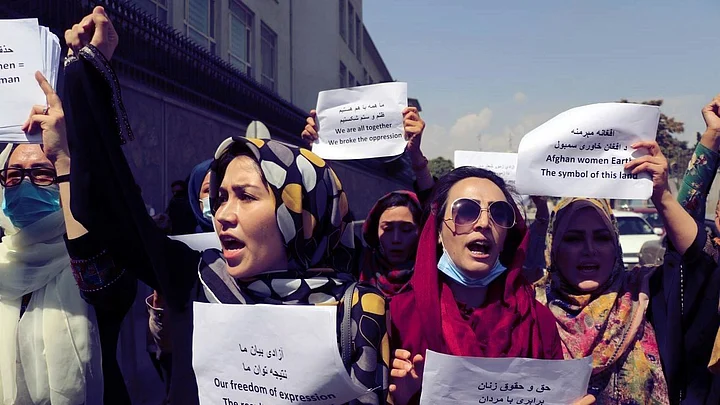The Taliban defied all odds and won a war very few would’ve bet on them to win. Their attrition warfare approach was easier to sustain due to its low cost compared to the hefty cost the Afghan defence forces and the NATO allies incurred every day of the past two decades in Afghanistan. The speed of the victory might have come as a surprise, but its likelihood had not.
Ex-US President Donald Trump’s sanctioning of a peace deal with the Taliban was him signing off on a handover of Afghanistan to the Taliban. If the goal was to negotiate a safe withdrawal and to concede to the Taliban, there were better ways to do it. Though there is enough blame to go around for the eventual outcome, the fact remains that there should have been some negotiation on the Afghan populations’ part to safeguard their rights in the new Afghanistan.
The 'Conservative' Argument
One month into their rule, the Taliban have asked university classes to be segregated, girls from classes 6 to 12 have been asked to stay home until further notice, and women have been told they would not hold jobs that men can do in their stead; the women’s ministry has been replaced with the ministry of virtue and vice. These are all changes that the post-US intervention generation of Afghans never thought they would have to see.
Apologists often justify the Taliban’s conservative vision for Afghanistan by pointing towards the majority of the population belonging to the rural areas and their ‘conservative’ nature. There are two fundamental differences between the citizens of the urban centres of Afghanistan and the rural areas.
First, the rural population barely ever chooses the lifestyle they have, nor do they have the option of opting out of it. Rural areas, due to lack of exposure to outsiders and foreign ideas, have become echo chambers for traditions. One can argue that a man in a distant district of Afghanistan chooses to grow a beard, but the reality is that they have not known anything but beards being let grow, nor would societal pressures allow him to shave off the beard.
The Taliban Have no Interest in Holding a Dialogue
The second difference is between the conscious informed choices made by educated urban populations and the implicit compliance shown by rural populations to the cultural code. There is a drastic disparity of agency, especially between rural and urban women. Whilst the rural women would have men come out to defend the way of life the man had set up for them, the others would demonstrate on the streets themselves to protect their vision for themselves and their country. This is not to say that one lifestyle should be imposed on the whole population, such a model would never be sustainable. The Taliban would need to have a dialogue with the urban population and negotiate a middle ground.
But such a negotiation should have been ideally held by the political elites who represented the urban population with the Taliban that represented the rural people.
By not realising their own impending defeat and choosing to flee in arrogance, the political elites passed on the task to the people themselves.
The total victory of the Taliban has reinforced an arrogance within them and a lack of interest in holding a dialogue with the population. This led to civil rights activists taking to streets and protest repression. In the absence of representatives to negotiate for them, these activists risked their lives by confronting trigger-happy Taliban fighters on the streets. The subsequent ban of demonstrations and the beating of journalists covering demonstrations was a clear message from the Taliban to political activists of the country.
Recession & Famine Are Pressing Issues
In a situation where the reward-to-risk ratio of political activism is so skewed, what should those working towards a more sustainable and reconciled Afghanistan do? There presently are two paths available. First, whilst the Taliban refuse to acknowledge the grievances of the population, political activists, including academics and scholars, would need to create spaces for discourse. The Afghan youth should be supported in their processing of the recent changes. The lack of possible practical ways forward would exacerbate grievances and push the youth towards eventual violence. Ideas for the future are also likely to emerge through such discussions.
Second, the urgent nature of the coming economic recession and famine should motivate activists to divert their and the youth’s energy towards preventing such a calamity. The urban population and civil society groups would be great candidates for the handling of foreign funding and the management of its distribution. The Taliban would need to support such efforts since it would still be better than the counterfactuals of no aid being given to Afghanistan or it being given to a third country, which would manage the aid without any real knowledge of the country’s needs. The emergency aid seems to be a band-aid solution to far deeper structural problems, but the Afghan civil society has no other option but to keep revolting against the absurd.
To borrow from Albert Camus, sometimes, a struggle has to be enough to fill one’s heart. One must imagine the Afghans happy in the face of such intolerable suffering, wherein the suffering then loses its meaning and the Afghans win, eventually.
(Obaidullah Baheer is a Lecturer of Transitional Justice at the American University in Afghanistan, and has an MA in international relations from the University of New South Wales, Australia. He is an adviser at the National Development Corporation. This is an opinion piece, and the views expressed are the author’s own. The Quint neither endorses nor is responsible for them.)
